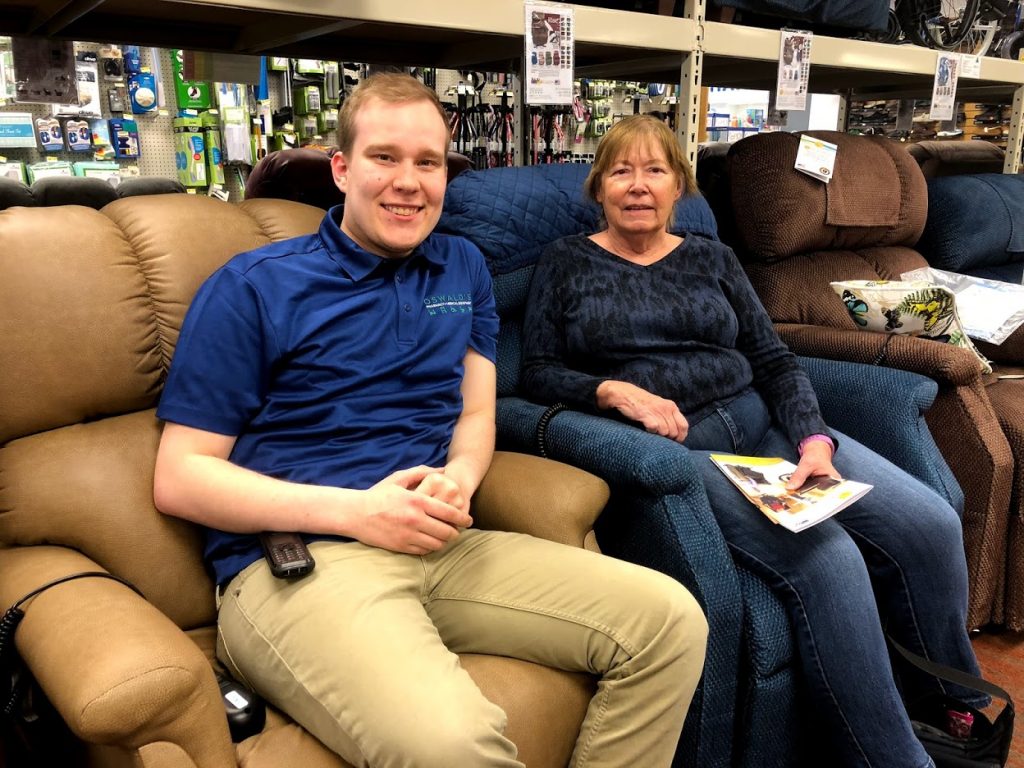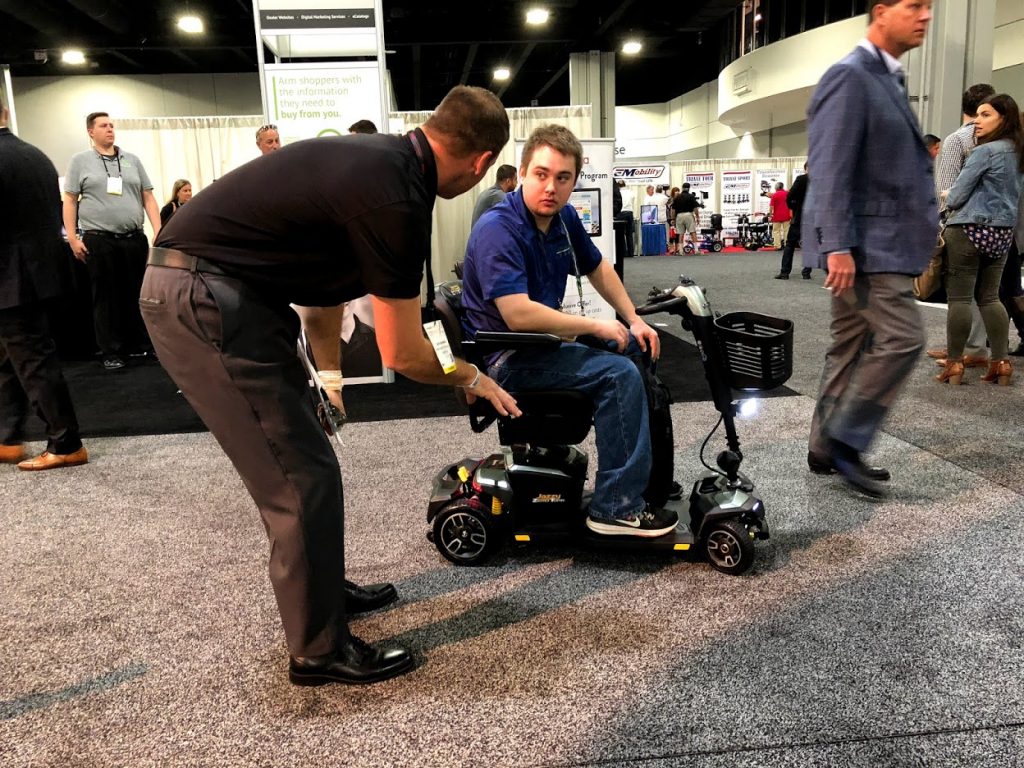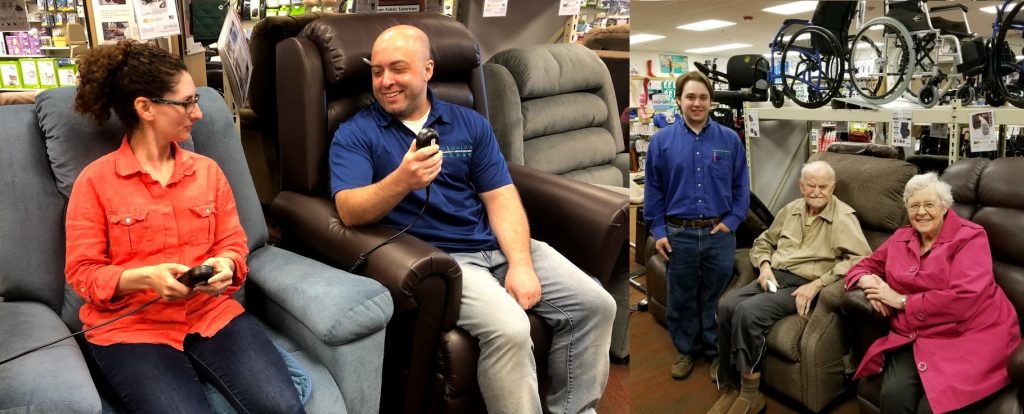We opened our 5,000 square foot medical equipment showroom in 2015 to better serve our customers. Going in blind by ordering a home medical equipment (HME) product online wasn’t working for a lot of people coming into the store.
Every one of us is built differently from one another. From height and weight to limb length and size, even people in the same height or weight range can have totally different needs for the same product. And this is before factoring in preexisting conditions!
The absolute best way to find the right medical equipment product for your needs is to test it. Our showroom floor is set up with many different sizes and types of the same product. You may think you have the ‘wrong’ product if the sizing is off; you may have to try a few sizes.
Save Time for Everyone
Getting the right DME product the first time is easier for all parties—the customer, the vendor, the manufacturer, and any third parties involved. Our employees are all trained to make sure customers get what they need. Having the actual patient there can save everyone time.
I can’t tell you how many times I have helped people on our showroom floor exchange a product MULTIPLE times. Usually, these multiple exchange cases are resolved when the actual end user comes in to try out different products and sizes.
I always urge customers to bring in their mom, dad, spouse, child—whoever needs the product—before the purchase is made to avoid multiple exchange situations. The time saved by everyone when the first product purchase is the last can’t be emphasized enough. In situations where a caregiver or family member only has a limited amount of time, purchasing right the first time is hugely beneficial.

Oswald’s inventory manager Matias sitting next to a customer he helped find the right medical equipment.
Products that NEED to be Tested
There are several medical equipment product categories that I would like to mention individually as test-before-you-buy.
Wheelchairs
Wheelchairs have a fairly large weight capacity range, as well as limited options for taller users. The average wheelchair weight capacity is around 250-275 lbs. Wheelchair manufacturers are partial to only giving weight capacities when sizing is recommended. A 5’6” woman and a 6’1” man, both of whom weigh 250 lbs., are built very differently.
Most wheelchair models are available with different seat widths. A larger seat width can make a HUGE difference when it comes to user comfort. Increasing wheelchair seat width by 2” can save a user from discomfort, bruising, and more.
Unfortunately, there are not very many options for taller users looking for a comfortable wheelchair. Some of the models we carry can be adjusted up 2-4 inches, as well as most wheelchair footrests being height adjustable. That being said—taller users still need to try out a wheelchair before buying! An extra inch or two on leg room could make all the difference in the world.
We have a large wheelchair selection in-stock at our Naperville location. Stop by any time to try one out!
Rolling Walkers
Rolling walkers (or rollators) come in so many sizes, styles and price ranges now, that seeing them in person is basically a necessity. Some of the rollators we carry come in 4 different sizes, with options for color, seat pads, handgrip pads, cup holders, and much more. There are two things most people don’t think about when looking at buying a rolling walker.
Rolling Walker Wheels
The first is looking at the wheels. This may seem trivial, but 5” wheels and 8” wheels are worlds apart when it comes to utility. Smaller wheels are fine for inside, but if you are going to be using a rollator outside bigger is better.
Wheel material is the other part of wheels—plastic or rubber? Plastic for inside, rubber for outside. Why? Plastic wheels get beat up by tough terrain fairly quickly. A damaged plastic wheel can scrape up nice wood floors if it goes unnoticed. Short distances outside, however, are fine with either wheel type. Rubber wheels are very durable and won’t scratch your floor.
Rolling Walker Seat Height
The second thing everyone looking to purchase a rolling walker should take a look at is the height of the seat. Seat heights start at 18” off the ground and go up to 24”. If you are tall, it will be very difficult to get out of an 18” rollator. What about a high seat for a shorter person? Isn’t that a problem as well? Well…
Many rolling walker users have trouble with mobility in general. Standing up is no exception. A person could be recommended to use a certain height by a manufacturer but still have trouble getting up. This is where testing comes in—if you try a walker out in person you can get a feel for what you need.
All of the rollators we stock have adjustable handles. A higher seat is still able to accommodate the other needs of shorter users.
Trying Out Power Lift Recliners and Scooters
The ‘luxury’ home medical equipment items should always be tested before purchase. These are expensive items that usually have restocking fees and, in some custom cases, are straight-up non-returnable. Getting a power lift recliner (lift chair) or mobility scooter that the user is comfortable with on the first try saves more time and headache than anything else we sell.
Lift Chairs
Lift chairs need to be sized per-patient, just like most pieces of home medical equipment. Unlike anything else in our HME department, however, lift chairs are based on personal preference the vast majority of the time.
I love the cushioning on the Golden Cloud lift chair. You could be the same size as me, sit in the Cloud and actually prefer one of the other chairs we offer. Remember, most lift chair users spend a large portion of their day in the chair. Being comfortable trumps just about everything else.
Just like wheelchairs and walkers, lift chair height and weight recommendations are not the end-all, be-all when buying one. Average lift chair weight capacity is around 350 lbs. I can tell you without a shadow of a doubt that a person in a petite or small lift chair that weighs anywhere close to 350 lbs. will be uncomfortable.
I have had smaller customers choose larger chairs and larger customers chooser smaller chairs. As long as there are no safety concerns, lift chairs are all about preference.
Mobility Scooters
This is the only product on our ‘try-before-you-buy’ list that shouldn’t take much convincing to get the user to come out to the store. Think of trying out mobility scooters like test driving a new car.
We have fancy models and budget models—go ahead and try any model that looks interesting out. There are a few things you need to look at when purchasing a mobility scooter (bet you didn’t see that coming).
The Three- or Four-Wheel Debate
Choosing a three- or four-wheel scooter has the most immediate safety concerns of any item on this list. Three-wheel scooters have a ‘0 turning radius,’ and they really do turn on a dime. If you take a turn too fast on a three-wheel scooter, however, there is a tipping hazard. Some people feel uncomfortable just knowing this.
Four-wheel scooters have a much wider turning radius than three-wheel models, but they have much better stability. If someone needs to rent a mobility scooter from us for a short time, but seem uneasy with using one, I always recommend the four-wheel model.
Just like a car, feeling how a mobility scooter handles before you buy one is a must. We have had many customers come in over the years set on one model, but they leave with another model (usually a similar model with more features).
It doesn’t help anyone if you bring a new scooter home to the user and they immediately crash it into a wall. Their confidence is immediately gone and this is VERY hard to repair. On request, we can have one of our certified scooter technicians help with demos. It’s very reassuring to have an expert guiding you every step of the way when trying something you are unsure of.

Oswald’s DME manager Jerry Anderson learning about a new scooter at a trade show.
Finding the Right HME Product for YOU
In the current retail landscape of maximizing profits, it can be very hard to find not just a product you need, but a version of that product that you like. We have a carefully curated selection of products hand picked by experts with decades of experience in the HME and DME industry.
Every employee here at Oswald’s is trained to find a customer what they need, not sell them the most expensive item. Our employees DON’T work on commission and are in no way incentivized to sell items just based on price. We do business by getting the best product for each individual customer.
We opened our DME showroom to better help customers, and that’s exactly what it’s doing. Our in-store customers have come to expect the best from us, and we are always looking for the most efficient ways to go about this.
Having a huge selection of HME products on our showroom floor has saved so much time for us and our customers since we opened the section. I really can’t stress just how much of an impact having a user or patient test an HME product before they buy it has.
Stop By Our Medical Equipment Showroom Today
Maybe the best part of trying out a specific HME product in our store is that you never have to set an appointment. We have certified staff on hand 7 days a week. Any member of our medical equipment team will be able to help you check out the different options available for your unique situation. We rent some of the more expensive products, like lift chairs and scooters, so you can try in-home before you buy!
Unique situations are what this industry is all about. We want to help you on a personal level. The best business-customer relationships are the mutual ones. We do the best job we can helping our customers choose the right equipment. In turn, our customers are some of our biggest advocates—when you get the service we provide, you want to talk about.
So… why are you still looking for home medical equipment products on the internet? Stop by our store, give us a call, email us, send a telegraph our way; we will help you find what you need. Not what the web says is ‘the best’ in a vacuum. It’s about you. Not the product.


